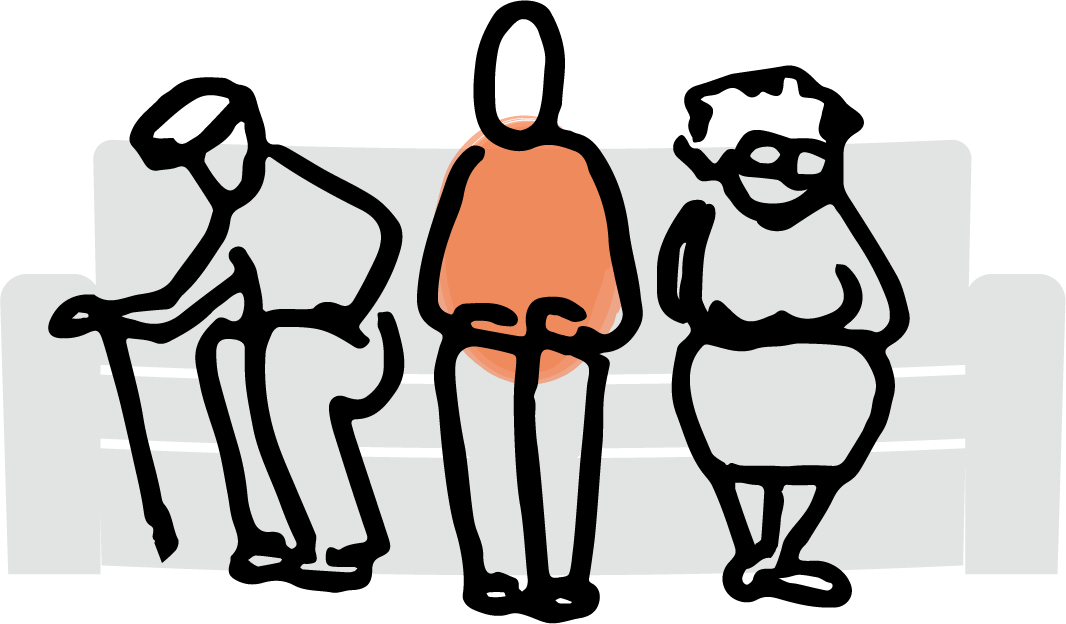Going Home for the Holidays?
How to tell your parents need help.
Spending the holidays with family always comes with a side dish of homemade stress.
Whether it’s dealing with a judgy aunt, an uncle whose opinions get louder with every drink, or inevitable sibling regression, keeping yourself centered isn’t always easy.
Those are familiar table stakes at a holiday table.
But when your parents are older, the stakes are higher, especially if you haven’t seen mom or dad in a while.
That’s because absence has a way of making it easier to notice changes. And when you have older parents, things change.
Which is why holiday visits are an ideal time to take stock of how your parents are doing at home — even if they’ve been telling you everything is fine.
Here are some tips about what to look for and classic warning signs your parents need help.
Memory and Thinking
Memory and thinking problems are fairly common as people age into their eighties and nineties. Just because mom forgot how old your youngest kid is doesn’t mean she’s losing it. Here are more concerning signs:
- Repeating the same story or question in the same conversation.
- Forgetting the month or the year.
- Problems following directions or doing familiar tasks.
- Unopened mail and unpaid bills.
- Mood swings or uncharacteristic behaviors (angry outbursts, crying, paranoia).
- Sudden spending pattern changes.
- Missed appointments with doctors and friends.
- Getting disoriented at home or lost while driving familiar routes.
Why it matters: Progressive cognitive problems affect every aspect of the journey. Early detection is key for safety, estate planning, and caregiving decisions. So the sooner your parent has a medical evaluation to understand what may be causing their memory and thinking problems, the better.
Important: Don’t assume it’s dementia. A number of other factors can affect memory, thinking, and behavior, such as medications, lack of sleep, dehydration, and urinary tract infections. All the more reason a proper medical evaluation makes good sense.
Mobility and Balance
There’s no way to really know of how steady your parent is on their feet, or how well they’re getting around until you’re in the room. Here are some common signs mom or dad needs help:
- Mom is “furniture surfing” for support as she moves.
- Dad has trouble getting out of chairs and going up and down the stairs.
- Your parent has poor hearing or vision, or both.
- Mom gets dizzy when she gets out of bed or a chair.
- Dad has a history of falls.
Why it matters: Fall safety is a recurring topic at My Aging Parentsfor a reason: One bad fall is all it takes to change your parent’s life — and yours.
A history of falling is also associated with higher risk of accidents behind the wheel. And fear of falling is a contributing factor to social isolation, loneliness, depression, and a greater risk for future falls.
Personal Appearance and Hygiene
Concerning changes in the grooming and personal hygiene are a clear sign that something is wrong. Telltale signs include:
- Weight loss or gain without an obvious explanation.
- Your normally put-together mom has stopped paying attention to her hair.
- Dad is missing spots when he shaves.
- Your parent smells like they haven’t bathed or brushed their teeth.
- Dad’s pants are wet or soiled.
Why it matters: Marked changes in physical appearance and hygiene are signals your parent needs help with physical, cognitive, or mental health challenges.
Weight loss is red flag that requires medical evaluation. Poor grooming and hygiene could be due to physical limitations, or signs of cognitive impairment, dementia, or depression. And fear of falling may be keeping them out of the shower.
Condition of the Home
Pay attention to the state of your parent’s home and living space. Here are some clues that mom and dad need more help to live safely at home or that it’s time to think about other options:
- Clutter is swallowing living space and creating dangerous trip and fire hazards.
- Dirty dishes and laundry are piling up.
- Mom struggles to step into the bathtub or dad struggles with the stairs.
- Mom can’t reach or bend down to get items from high and low kitchen cabinets.
- Smells from garbage, litter boxes, urine, or spoiled food in the fridge.
- The spare bedroom looks like an abandoned storage unit.
- The home needs major repairs and maintenance.
Why it matters: Most older adults say they want to live at home as long as possible. But many have not made plans or taken steps to do so.
Home safety can be improved by installing grab bars, better lighting, and clearing clutter.
A messy, cluttered house can also be sign of physical or mental health conditions that need to be addressed. Unsanitary conditions and spoiled food might be signs of cognitive impairment or depression. Overdue repairs and maintenance could also mean your parent is overwhelmed or having financial problems.
Mind the Meds
If your parent seems confused or lethargic, more forgetful, or less steady on their feet than usual, take a closer look at their meds. It’s not uncommon for drug interactions and side effects to cause dizziness, drowsiness, and memory problems.
More reasons to mind the meds:
- Dad’s medicine cabinet is cluttered with new and old prescriptions.
- Unopened and expired pill bottles throughout the house.
- The pill organizer you bought mom is nowhere to be found.
- The meds due for refill next week have more than half the pills left in the bottle.
- Mom has prescriptions for multiple meds from multiple doctors.
Why it matters: The more meds an older adult takes, the greater the risk for dangerous side effects, especially if your parent has memory problems or prescriptions from different docs.
Ask your parent’s primary care physician to do a “brown bag checkup” — a comprehensive review for all your parent’s meds (Rx and OTC) to identify possible interactions and safer alternatives.
“Make Observations, Not Assumptions”
Remember, the primary reason you’re going home is to reconnect with family, not to conduct an audit of your parents’ health and safety or turn Thanksgiving into an inquisition.
You are not there to “fix” your parents, even if the changes you notice are unsettling.
So don’t jump to conclusions — unless you see immediate threats to safety, such as aggressive behavior (or evidence that the turkey isn’t the only thing your mother has burned in the oven).
“Make observations, not assumptions,” writes Dr. Laurie Archbald-Pannone, a geriatrician and associate professor of medicine at the University of Virginia.
“Observing [your parent’s] functioning and memory can uncover warning signs that more evaluation is needed.”
Don’t assume you understand their situation… The holidays can bring chaotic schedules. Many people can be overwhelmed by their commitments, or forget important plans, and it’s not necessarily a sign of dementia. Anybody can forget to bring home cranberry sauce or which exact yogurt the grandkids like.”
When and How to Talk With Your Parents
Talking with your parents to understand their perspective is an essential next step. Wait for a quiet, private moment. And get your head right place before you open your mouth.
The last thing you want is to turn your visit into Lifetime’s next holiday melodrama.
Take a collaborative approach, says Iris Waichler, LSCW, and author of Role Reversal, How to Take Care of Yourself and Your Aging Parents.
“You can say, ‘It’s been great spending time with you, and I want to talk about what you’d like moving forward…. It’s good for us to know so we can help you have the best quality of life based on what you want to do.’”
Don’t be discouraged by resistance. Having a conversation about safety, health, and hygiene isn’t something your parent is going to be thrilled about at any time, but especially if they feel ambushed during the holidays.
The important thing is to plant the seed and follow up. Waichler advises trying again after the holidays: Tell your parent “My New Year’s resolution is to help figure out how I can best help you make your life as wonderful as possible.”
For More:
- How to Know When Your Elderly Parents Need Help at Home and When to Intervene (AgingCare)
- Checklist for Visiting Elderly Parents (DailyCaring)
- How to Have Tough Conversations With Aging Parents (Holiday Edition) (JFS Care)
Thanks for caring,

New to My Aging Parents?
Join us for practical tips and strategies to help you meet the challenges of helping your aging parents. Hand picked and delivered by email biweekly.
No charge. No spam. Unsubscribe anytime.
